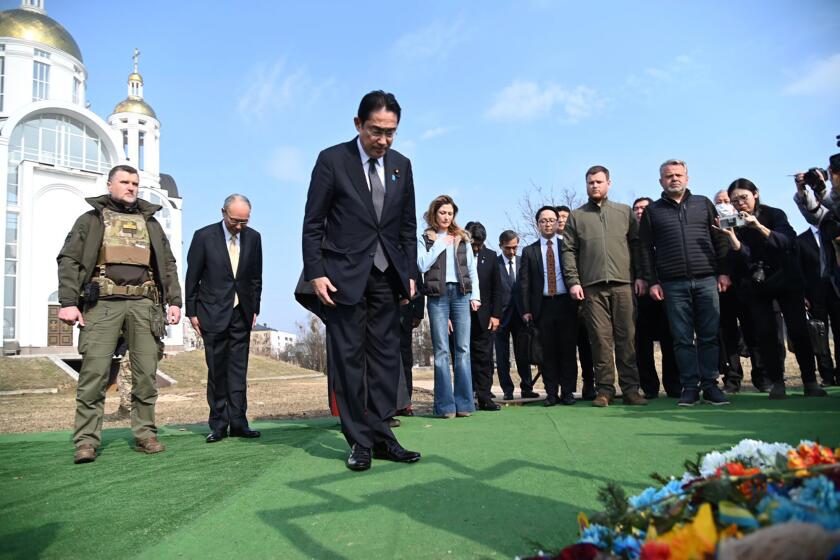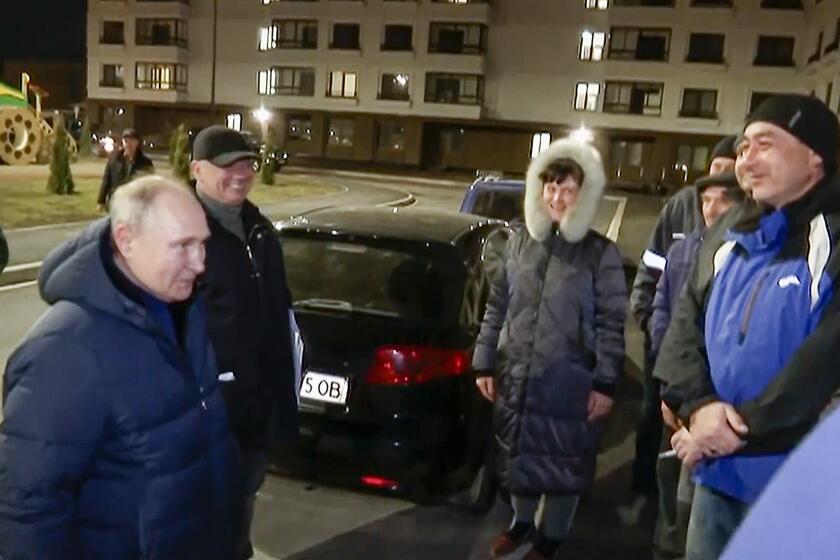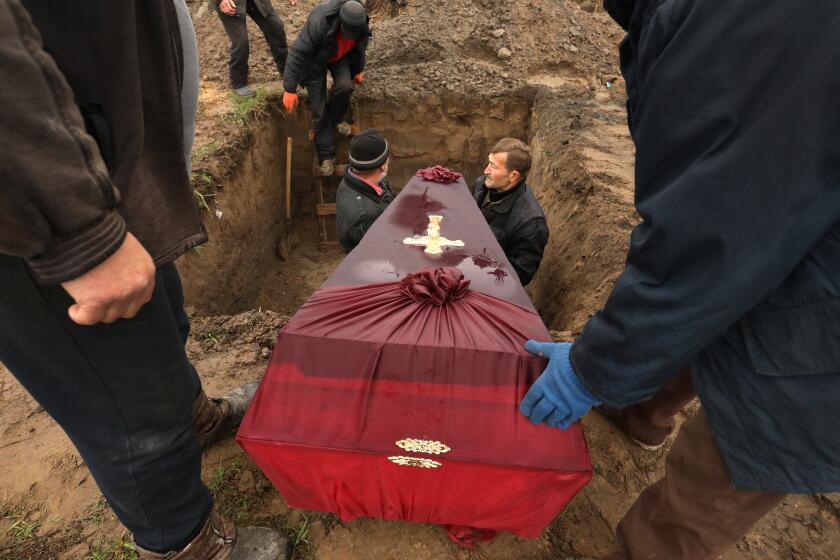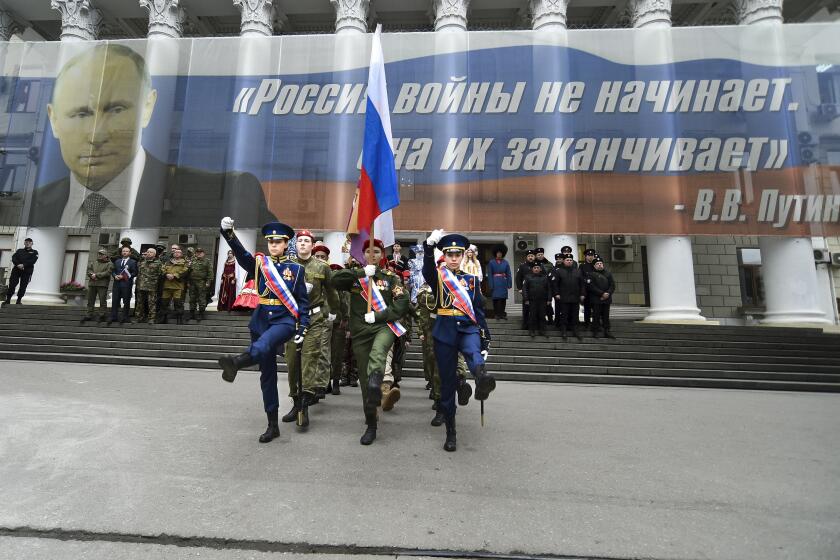Putin and Xi call each other a ‘dear friend.’ But their main common cause is the U.S.
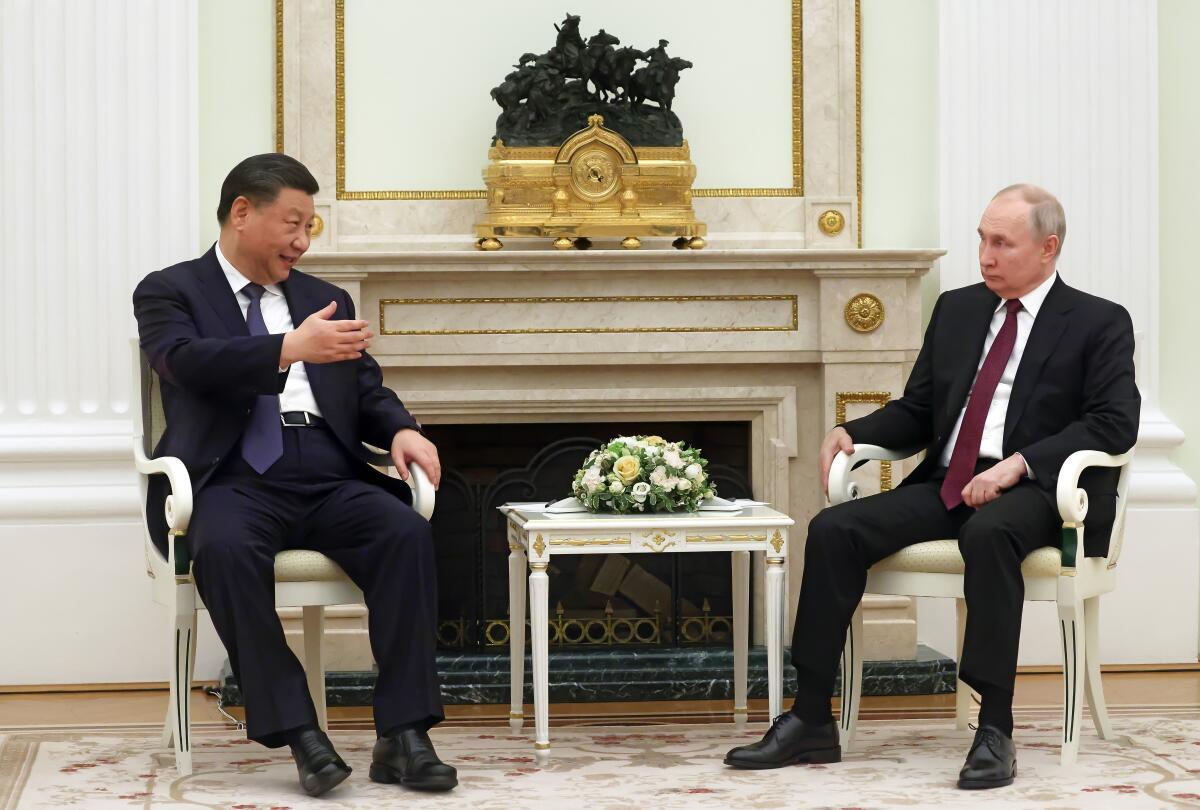
- Share via
WASHINGTON — When China’s Xi Jinping and Russia’s Vladimir Putin sat down together in Moscow on Monday, the trappings were those of imperial power, and the bonhomie hung heavy in the air.
They addressed each other as “dear friend.” They chatted while sitting in ornate chairs in a gilded salon. On Tuesday, the two autocratic presidents dined at a state banquet in a richly frescoed hall used by a long line of Russian czars.
It was a clear message of two great powers coming together — along with the conspicuous absence of a third: the United States.
Xi’s three-day visit to Moscow is the clearest symbol yet of the deepening ties between two countries that have had a history of fraught relations but that are now finding common cause in directly challenging the U.S. and the West. China and Russia are intent on fundamentally shifting the world order in their favor — and away from the rules that have regulated Western-dominated post-World War II geopolitical arrangements, analysts say.
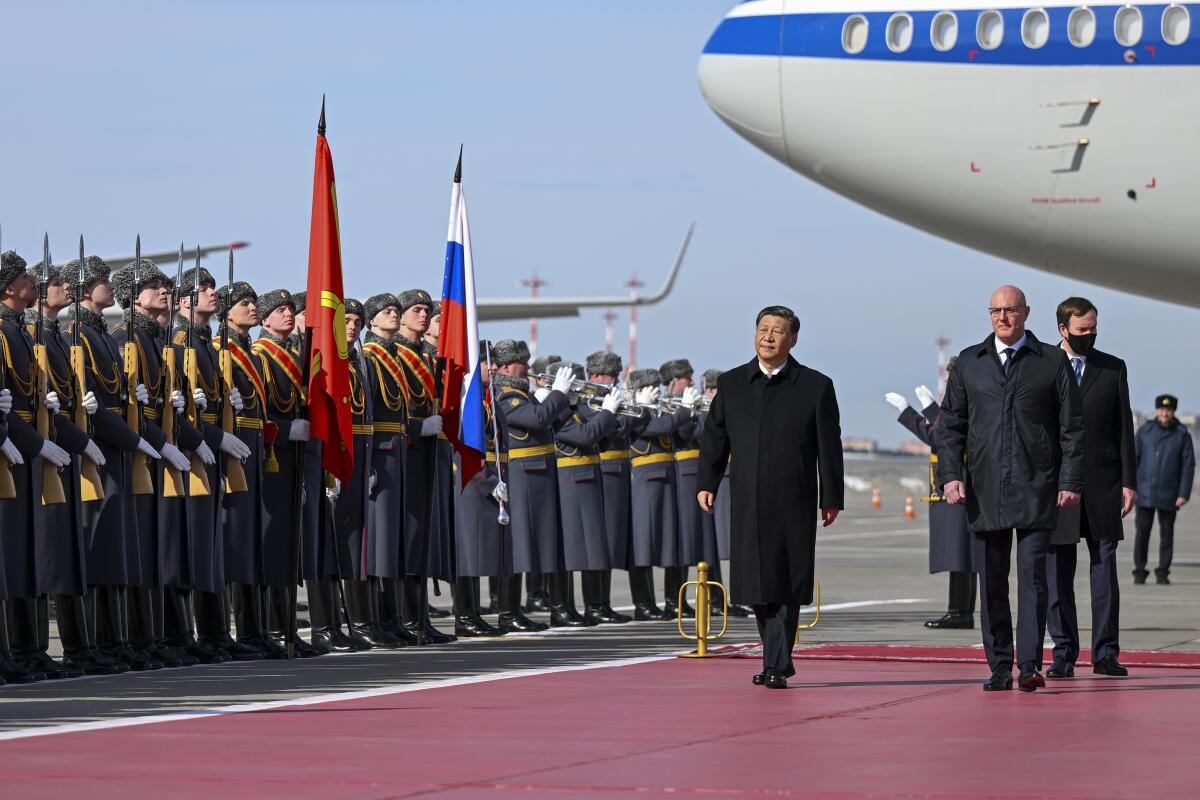
That goal has been both furthered and complicated by the war in Ukraine, which is now nearing its 13-month mark.
Shortly before Russian tanks barreled across the border on Feb. 24, 2022, Putin and Xi met on the margins of the Winter Olympics in Beijing and declared a cooperation “without bounds.” Since then, China has voiced support for Russia without directly endorsing the invasion, and refrained from joining in sanctions against Moscow.
Japanese Prime Minister Fumio Kishida began a surprise visit to Ukraine hours after Chinese President Xi Jinping arrived in Moscow for a summit.
But Xi must carefully calibrate his support, analysts say, lest he find himself sullied by the international opprobrium surrounding Putin. Last week, the International Criminal Court issued arrest warrants for the Russian president and an aide for alleged war crimes, including the forced deportation of Ukrainian children to Russia, the first such indictments handed down in connection with the Russian invasion.
Throughout the war, China has attempted to maintain a delicate balance between nurturing its political and economic relationship with Russia without alienating other countries upon which it’s relying to help get its COVID-hit economy back on its feet. But that has become more difficult to sustain as Russia has suffered heavy losses in Ukraine and looks to Beijing for military as well as diplomatic support.
“The Chinese want to maintain the strategic partnership, but also want to protect their reputation and economic interests,” said Joseph Torigian, an assistant professor at the School of International Service at American University. “What the Chinese don’t want to do is look like they are facilitating Russian aggression.”
Russian President Vladimir Putin visits the occupied port city of Mariupol, Ukraine, after traveling to Crimea earlier in the day.
At the same time, Xi appears confident he can outwit Washington and carve out a greater role for Beijing on the world stage. China this month brokered an agreement restoring diplomatic ties between archrivals Saudi Arabia and Iran, showcasing its ability to make deals where the U.S. can’t — and pointedly involving a long-standing if problematic U.S. ally, Saudi Arabia.
Beijing’s revved-up diplomatic activity has included an attempt to appear as a potential peacemaker in Ukraine. China recently put forward a 12-point plan that it said was a road map to halt the fighting — one that was, unsurprisingly, favorable to Russia.
The U.S. has been scathing in its criticism of both Xi’s trip to Moscow and his government’s proposal for a cease-fire in Ukraine.
Xi’s high-profile visit on the heels of the ICC warrant suggests that “China feels no responsibility to hold the Kremlin accountable for the atrocities committed in Ukraine,” Secretary of State Antony J. Blinken said Monday at a news conference in Washington. Beijing “would rather provide diplomatic cover for Russia to continue to commit those very crimes,” he said.
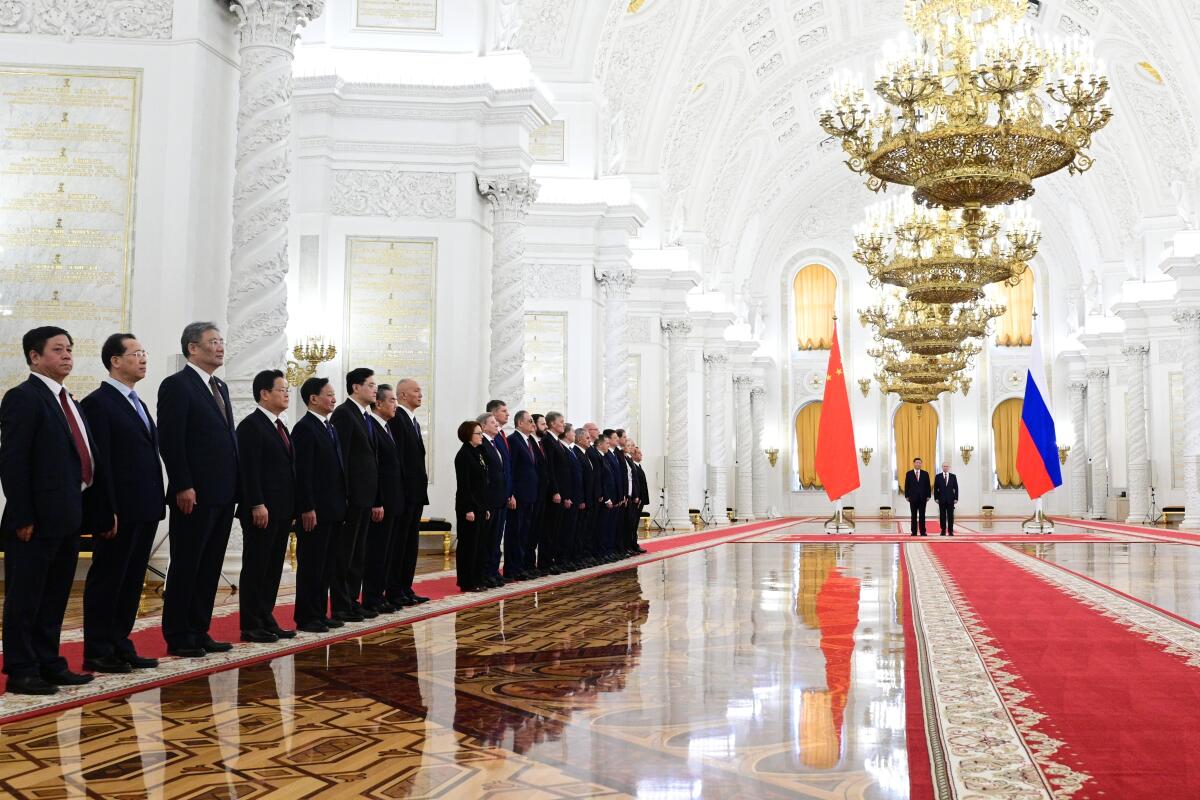
As for Beijing’s peace plan, Blinken said that cementing the current positions of Russian and Ukrainian forces “would effectively be supporting the ratification of Russian conquest.”
“The world should not be fooled by any tactical move by Russia — supported by China or any other country — to freeze the war on its own terms,” he said.
U.S. officials have said that China is also considering sending artillery shells to Russia, though they have warned their Beijing counterparts against providing military support. If Beijing did supply arms to Russia, analysts said, it could irreparably damage China’s relationships with the U.S. and other Western countries, crossing a line that Xi has so far shied away from.
Russian atrocities number in the tens of thousands, Ukraine says. The ICC wants to arrest Putin. But what are the prospects for justice?
“For China to take the step of providing Russia with serious quantities of weapons and ammunition would plunge U.S.-China relations into a state from which they may not recover,” Diana Choyleva, chief economist at Enodo Economics, a China-focused consulting firm, wrote in a report last week.
Asked about the possibility of China supplying artillery to Russia, Wang Wenbin, a Chinese Foreign Ministry spokesperson, reiterated the need for peace talks and criticized the U.S. for sending weapons to Ukraine, according to a readout of Monday’s news briefing.
Kyiv is playing a cautious game of its own. It has ruled out accepting any of Russia’s territorial seizures to date, but has been careful to not criticize Beijing over its cease-fire proposal. In his nightly address to his compatriots on Monday, Ukrainian President Volodymyr Zelensky, who is reportedly to speak with the Chinese leader by phone later this week, did not mention the Moscow summit.
In many respects, China and Russia make complementary partners, although Moscow is now the junior power after its decades of economic, political and military superiority during the Cold War. Despite recent downturns, China has a robust economy with access to markets and raw materials the world over and a formidable “wolf warrior” corps of diplomats fighting for Beijing’s interests.
News Alerts
Get breaking news, investigations, analysis and more signature journalism from the Los Angeles Times in your inbox.
You may occasionally receive promotional content from the Los Angeles Times.
Russia is more isolated, its economy buffeted by international sanctions, costs of the Ukraine war and chronic corruption and mismanagement. But Russia also has large supplies of oil, natural gas and other commodities that China covets.
“It’s a bit of a marriage of convenience,” U.S. National Security Council spokesman John F. Kirby told reporters Monday.
China has provided Russia with economic support through purchases of oil and gas and technology exports such as semiconductors. Trade between the two rose 34% in 2022 to a record high of $190 billion, according to Chinese customs data.
Xi is also playing to another audience, the so-called Global South, mostly developing countries in the Southern Hemisphere where China has found fertile field for diplomacy and the exploitation of raw minerals and other resources, and where it will be easier for Xi to portray himself as a balanced broker in resolving the conflict, said Evan Feigenbaum, a former senior State Department official specializing in Asia who is now at the Carnegie Endowment for International Peace.
Russia has weathered sweeping economic sanctions over the Ukraine war better than many expected, but the months ahead could pose a tougher test.
“Partnership with Putin’s Russia is not cost-free, since Beijing pays a price reputationally, with Europe in particular,” Feigenbaum wrote in an essay on the Carnegie website. “But partnership with the albatross in Moscow will pay dividends for China, too.”
Beijing, he wrote, “will hardly come away from Xi’s visit empty-handed. ... It will win contracts, assure Russia’s enduring economic dependence on China, and link the two countries’ resource producing and consuming sectors more closely together.”
While Russia has framed Xi’s visit as evidence of strengthening ties — and unleashed bombastic anti-Western rhetoric in touting it — Chinese officials have struck a more nuanced tone. But China has echoed Russia’s concerns about North Atlantic Treaty Organization expansion and criticized the U.S. for its military assistance to Ukraine.
The eventual outcome of the war in Ukraine could have significant implications for Xi’s vision of “national rejuvenation,” including his ambitions to bring the democratic island of Taiwan under Communist Party rule.
Russia’s Defense Ministry says the fighter pilots involved in an encounter with a U.S. drone that resulted in its crashing will be given state awards.
Moscow is the Chinese president’s first international destination since beginning his third five-year term as head of China’s Communist Party. Xi has met Putin dozens of times over their respective long years in power; his first state visit to Russia as president was in 2013. In Moscow on Tuesday, he said he had invited Putin to Beijing later this year.
“This summit is a very clear indication that when it comes to the geopolitics of the next decade or more, China is very determined that it will show its support for Russia,” said Rana Mitter, a China expert at Oxford University. “China finds it very useful to have Russia essentially as a partner who can’t say no.”
Perhaps mindful of the reputational blow China has suffered in Europe for its tacit acceptance of Putin’s actions, China’s top diplomat, Wang Yi, last month visited France, Italy and Hungary in what was seen as an effort to ease strained relationships.
While Xi’s meeting with Putin may undercut those overtures, even being part of the conversation regarding Ukraine could further the perception of China as an important player in international affairs, analysts said.
“It gives [Xi’s] ability to be a global statesperson more support,” said Ja Ian Chong, an associate professor of political science at the National University of Singapore. “It may not be tangible or material, but it does bolster China’s standing, and that’s something that Xi has been desiring.”
Wilkinson reported from Washington and Yang from Taipei, Taiwan. Times staff writer Laura King in Berlin contributed to this report.
More to Read
Sign up for Essential California
The most important California stories and recommendations in your inbox every morning.
You may occasionally receive promotional content from the Los Angeles Times.
